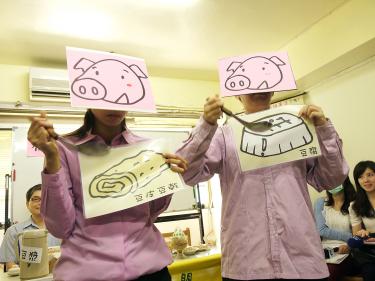By Alison Hsiao / Staff reporter
Members of the Genetic Modification-Free Zone Alliance wear drawings of pigs as they hold up pictures of soy-based foods at a press conference in Taipei yesterday. The alliance urged elementary schools not to use “fodder-grade” soybeans in school lunches.
Photo: Lin Chia-chi, Taipei Times
The Genetic Modification-Free Zone Alliance yesterday called on elementary schools nationwide to stop providing fodder-grade soybeans in school lunches.
As elementary and junior-high schools are now calling for bids for one-year or two-year contracts to provide school lunches, the lunch evaluation committee at each school should incorporate “non-genetically modified soybean food products” as an evaluation item, said the alliance, which includes the Homemakers United Foundation, the Homemakers Union Consumers Co-op, the Green Formosa Front and the Seed Lab of National Taiwan University’s agronomy department.
“Most of the soybean food products Taiwanese consume are made of imported soybeans and according to Department of Health statistics, 90 percent of imported soybeans are genetically modified [GM] beans,” foundation secretary-general Huang Chia-lin (黃嘉琳) said.
Vendors refer to GM soybeans as “fodder soybeans,” Huang said.
“In exporting countries, soy oil is extracted from GM soybeans and the soy grits left behind are used as livestock feed. This is why they are called fodder soybeans,” Huang said.
A survey conducted by the foundation found that of the 20 or so types of vegetables provided in school meals in a five-day week, four to seven kinds are soybean products.
Warren Kuo (郭華仁), an agronomy professor at National Taiwan University, said that compared with Japan and South Korea, whose soybean self-sufficiency rates are 6 percent and 9 percent respectively, Taiwan has an extremely low 0.05 percent.
“Out of the 200,000 tonnes of soybeans imported annually, only 20,000 are food-grade soybeans,” Kuo said.
Fodder-grade soybeans imported from the US and Brazil expose consumers to three health hazards, Kuo said.
“First, the imported soybeans are not packaged, so transporters have to apply antimicrobials to them to inhibit the growth of molds. Second, the beans are genetically modified. Third, the level of herbicide residue is high in GM products,” Kuo said.
A parent, surnamed Chang, urged the government, schools and parents to face up to the potential health risk of GM food.
“This is not just a problem for my six-year-old. GM products pose a threat to his reproductive health as well, so it is a problem for the children of my child,” Chang said.
原始網址:http://www.taipeitimes.com/News/taiwan/archives/2013/05/08/2003561757



 留言列表
留言列表
